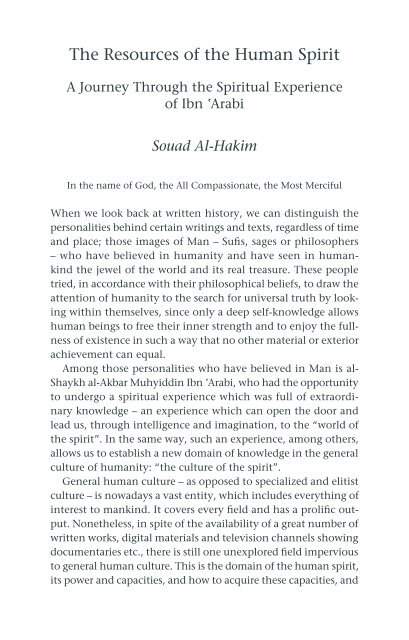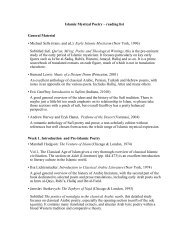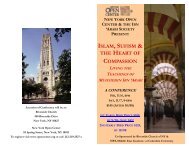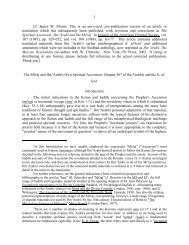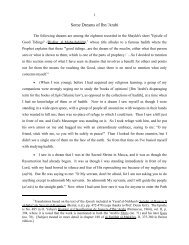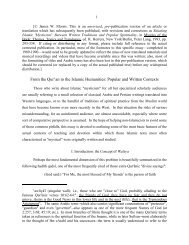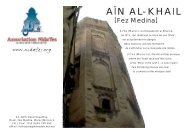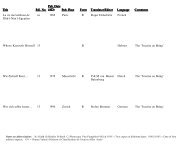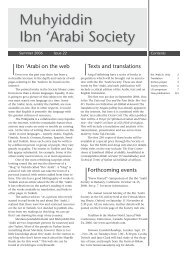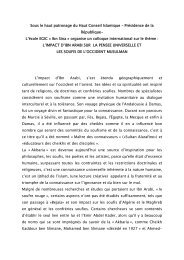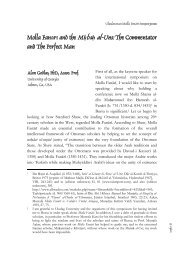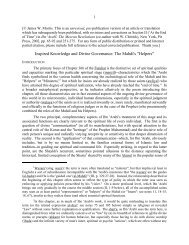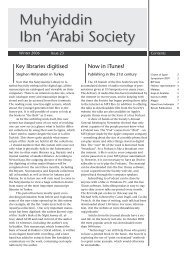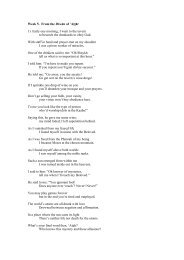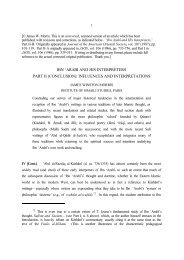The Resources of the Human Spirit - Muhyiddin Ibn Arabi Society
The Resources of the Human Spirit - Muhyiddin Ibn Arabi Society
The Resources of the Human Spirit - Muhyiddin Ibn Arabi Society
Create successful ePaper yourself
Turn your PDF publications into a flip-book with our unique Google optimized e-Paper software.
<strong>The</strong> <strong>Resources</strong> <strong>of</strong> <strong>the</strong> <strong>Human</strong> <strong>Spirit</strong>A Journey Through <strong>the</strong> <strong>Spirit</strong>ual Experience<strong>of</strong> <strong>Ibn</strong> ¡<strong>Arabi</strong>Souad Al-HakimIn <strong>the</strong> name <strong>of</strong> God, <strong>the</strong> All Compassionate, <strong>the</strong> Most MercifulWhen we look back at written history, we can distinguish <strong>the</strong>personalities behind certain writings and texts, regardless <strong>of</strong> timeand place; those images <strong>of</strong> Man – Sufis, sages or philosophers– who have believed in humanity and have seen in humankind<strong>the</strong> jewel <strong>of</strong> <strong>the</strong> world and its real treasure. <strong>The</strong>se peopletried, in accordance with <strong>the</strong>ir philosophical beliefs, to draw <strong>the</strong>attention <strong>of</strong> humanity to <strong>the</strong> search for universal truth by lookingwithin <strong>the</strong>mselves, since only a deep self-knowledge allowshuman beings to free <strong>the</strong>ir inner strength and to enjoy <strong>the</strong> fullness<strong>of</strong> existence in such a way that no o<strong>the</strong>r material or exteriorachievement can equal.Among those personalities who have believed in Man is al-Shaykh al-Akbar <strong>Muhyiddin</strong> <strong>Ibn</strong> ¡<strong>Arabi</strong>, who had <strong>the</strong> opportunityto undergo a spiritual experience which was full <strong>of</strong> extraordinaryknowledge – an experience which can open <strong>the</strong> door andlead us, through intelligence and imagination, to <strong>the</strong> “world <strong>of</strong><strong>the</strong> spirit”. In <strong>the</strong> same way, such an experience, among o<strong>the</strong>rs,allows us to establish a new domain <strong>of</strong> knowledge in <strong>the</strong> generalculture <strong>of</strong> humanity: “<strong>the</strong> culture <strong>of</strong> <strong>the</strong> spirit”.General human culture – as opposed to specialized and elitistculture – is nowadays a vast entity, which includes everything <strong>of</strong>interest to mankind. It covers every field and has a prolific output.None<strong>the</strong>less, in spite <strong>of</strong> <strong>the</strong> availability <strong>of</strong> a great number <strong>of</strong>written works, digital materials and television channels showingdocumentaries etc., <strong>the</strong>re is still one unexplored field imperviousto general human culture. This is <strong>the</strong> domain <strong>of</strong> <strong>the</strong> human spirit,its power and capacities, and how to acquire <strong>the</strong>se capacities, and
22 Souad Al-Hakim<strong>the</strong> potential achievements that every human being can attainthrough a deep understanding <strong>of</strong> his or her spirit.Based on <strong>Ibn</strong> ¡<strong>Arabi</strong>’s writings, this paper contributes to <strong>the</strong>establishment <strong>of</strong> a culture, which aims to explore <strong>the</strong> world <strong>of</strong> <strong>the</strong>human spirit as part <strong>of</strong> <strong>the</strong> real world and not as science fiction.<strong>The</strong> study is divided into nine sections which I believe <strong>of</strong>fer acomplete image <strong>of</strong> <strong>the</strong> practical side <strong>of</strong> <strong>the</strong> human spirit accordingto <strong>Ibn</strong> ¡<strong>Arabi</strong>. <strong>The</strong>se nine sections, which also demonstrate<strong>the</strong> strength, <strong>the</strong> diversity <strong>of</strong> powers and <strong>the</strong> extraordinary effects<strong>of</strong> <strong>the</strong> human spirit, are as follows:I. <strong>The</strong> nature <strong>of</strong> <strong>the</strong> human spirit.II. <strong>The</strong> location <strong>of</strong> <strong>the</strong> human spirit in <strong>the</strong> kingdom <strong>of</strong> man.III. <strong>The</strong> relation between <strong>the</strong> body and <strong>the</strong> spirit.IV. <strong>The</strong> relation between <strong>the</strong> spirit and <strong>the</strong> soul.V. <strong>The</strong> origin <strong>of</strong> <strong>the</strong> spirit and <strong>the</strong> source <strong>of</strong> its powers andcapacities.VI. <strong>The</strong> acquisition <strong>of</strong> spiritual powers.VII. A first stage <strong>of</strong> spiritual experience which gives humanspleasure and allows human reasoning to leave aside<strong>the</strong> “logic <strong>of</strong> <strong>the</strong> real” and to accept a higher and moredeveloped reasoning: <strong>the</strong> logic <strong>of</strong> <strong>the</strong> Real.VIII. A second stage <strong>of</strong> spiritual experience capable <strong>of</strong> showingthat <strong>the</strong> human spirit is able to increase <strong>the</strong> strength and<strong>the</strong> senses <strong>of</strong> human beings, making it possible to see whato<strong>the</strong>rs cannot see and hear what o<strong>the</strong>rs cannot hear.IX. A third stage <strong>of</strong> spiritual experience that shows <strong>the</strong> ability<strong>of</strong> <strong>the</strong> spirit to leave <strong>the</strong> body and pass through <strong>the</strong> dimensions<strong>of</strong> space and time in order to broaden <strong>the</strong> field <strong>of</strong>human knowledge and establish <strong>the</strong> vicegerency 1 <strong>of</strong> man:night-journeys, ascensions, spiritual ga<strong>the</strong>rings, etc.1. Vicegerency is a synonym <strong>of</strong> <strong>the</strong> Caliphate according to <strong>the</strong> Quranicverses.
<strong>The</strong> <strong>Resources</strong> <strong>of</strong> <strong>the</strong> <strong>Human</strong> <strong>Spirit</strong>23I. <strong>The</strong> Nature <strong>of</strong> <strong>the</strong> <strong>Human</strong> <strong>Spirit</strong>It is not easy to refer to <strong>the</strong> nature <strong>of</strong> <strong>the</strong> spirit, since <strong>the</strong> spirit isa metaphysical concept that is subject to nei<strong>the</strong>r observation norstudy. Never<strong>the</strong>less, this section seeks to define <strong>the</strong> characteristics<strong>of</strong> <strong>the</strong> spirit: visible in its actions but invisible in its essence.1. Opinions on <strong>the</strong> nature <strong>of</strong> <strong>the</strong> spirit<strong>Ibn</strong> ¡<strong>Arabi</strong>’s opinions differ slightly from those <strong>of</strong> earlier masterson <strong>the</strong> nature <strong>of</strong> <strong>the</strong> spirit, and in his spiritual work Al-Tadb¨råtal-ilåhiyya f¨ ißlå¢ al-mamlaka al-insåniyya, 2 he mentions <strong>the</strong>sedifferences. 3 We shall not consider <strong>the</strong> debate <strong>the</strong>se opinionsprovoked here, but instead will summarize three <strong>of</strong> <strong>the</strong>m:1. <strong>The</strong> spirit is an essence which is individual and has location,and comprises <strong>the</strong> moral characteristics <strong>of</strong> human beings. Itis different from <strong>the</strong> life which exists in an animal.2. According to ¡Abd al-Malik b. Hab¨b, <strong>the</strong> spirit is a subtleimage which is similar to <strong>the</strong> body. As with <strong>the</strong> body, it haseyes, ears, hands and feet that can be located in <strong>the</strong> sameplaces as <strong>the</strong>ir counterparts in <strong>the</strong> body.3. Imåm Ab¬ Håmid al-Ghazål¨ is one <strong>of</strong> <strong>the</strong> advocates <strong>of</strong> a thirdopinion, stating that <strong>the</strong> spirit is a recent essence which existsby itself and is impossible to locate; it is nei<strong>the</strong>r inside noroutside <strong>the</strong> body, and it is nei<strong>the</strong>r joined to nor separate fromit, since its location is impossible to determine.<strong>Ibn</strong> ¡<strong>Arabi</strong>’s comments show his tolerance and acceptance <strong>of</strong>different opinions. He argues that diversity <strong>of</strong> opinion is notharmful and does not have any effect upon <strong>the</strong> roots <strong>of</strong> <strong>the</strong>Sharia, since all <strong>of</strong> <strong>the</strong>se viewpoints state that <strong>the</strong> spirit is recent.He finishes his discussion thus: “May God grant success to all<strong>of</strong> <strong>the</strong>m”.After acknowledging <strong>the</strong>se opinions, <strong>Ibn</strong> ¡<strong>Arabi</strong> does not statehis own view on <strong>the</strong> nature <strong>of</strong> <strong>the</strong> spirit. He simply declares: “We2. <strong>Ibn</strong> ¡Arab¨ describes this spiritual work in his book ¡Anqå¤ Mughrib.3. Al-Tadb¨råt al-ilåhiyya f¨ ißlå¢ al-mamlaka al-insåniyya, pp. 129–31(Leiden, 1919).
24 Souad Al-Hakimare nei<strong>the</strong>r in favour <strong>of</strong>, nor against, any <strong>of</strong> <strong>the</strong>se viewpoints,even though one <strong>of</strong> <strong>the</strong>m stands out above <strong>the</strong> o<strong>the</strong>rs … But thishas already been discussed in ano<strong>the</strong>r work.”Thus, his opinion regarding <strong>the</strong> spirit is diffused throughouthis writings and is not easy to locate, like treasure concealedwithin locked chests. <strong>The</strong> one who wishes to find this knowledgemust <strong>the</strong>refore search for it, by unifying and unlocking <strong>the</strong>meanings within words so as to discover <strong>the</strong> true nature <strong>of</strong> <strong>the</strong>spirit. This is what we will attempt to do below.2. <strong>The</strong> origin <strong>of</strong> <strong>the</strong> human spiritIn order to understand <strong>the</strong> nature <strong>of</strong> any creature, it is necessaryto observe how it has come into existence. Indeed, an understanding<strong>of</strong> its origin will lead us to an understanding <strong>of</strong> itsnature. Based on this premise, we will try to find those quotesfrom <strong>Ibn</strong> ¡<strong>Arabi</strong>’s works that mention how <strong>the</strong> human spirit hascome into existence.According to <strong>Ibn</strong> ¡<strong>Arabi</strong>, <strong>the</strong> human spirit is born from amo<strong>the</strong>r and a fa<strong>the</strong>r. Its fa<strong>the</strong>r is <strong>the</strong> divine spirit, God’s Soul,<strong>the</strong> Merciful Breath and its nature is light; its mo<strong>the</strong>r is <strong>the</strong>already-formed body, composed <strong>of</strong> <strong>the</strong> elements, and its natureis darkness.<strong>The</strong> fact <strong>of</strong> being born from both a mo<strong>the</strong>r and a fa<strong>the</strong>r meansthat <strong>the</strong> spirit has a combined nature, which gives its essencea tw<strong>of</strong>old status, similar both to its fa<strong>the</strong>r, “light”, and to itsmo<strong>the</strong>r, “darkness”. Because <strong>of</strong> this, <strong>the</strong> spirit is able to join <strong>the</strong>originally pure world <strong>of</strong> <strong>the</strong> lights, “<strong>the</strong> world <strong>of</strong> its fa<strong>the</strong>r, <strong>the</strong>world <strong>of</strong> <strong>the</strong> spirit”. At <strong>the</strong> same time it also has <strong>the</strong> ability toenter <strong>the</strong> body and thus to join <strong>the</strong> world <strong>of</strong> its mo<strong>the</strong>r, and tobe submerged in <strong>the</strong> darkness.<strong>Ibn</strong> ¡<strong>Arabi</strong> mentions that <strong>the</strong> divine spirit is <strong>the</strong> fa<strong>the</strong>r <strong>of</strong> <strong>the</strong>human spirit, whereas its mo<strong>the</strong>r is <strong>the</strong> already formed body. Hesays: “<strong>the</strong> human subtlety is born from <strong>the</strong> union <strong>of</strong> <strong>the</strong> divinespirit, which is <strong>the</strong> breath <strong>of</strong> God <strong>the</strong> Merciful, and <strong>the</strong> alreadyformed body composed <strong>of</strong> <strong>the</strong> formed elements <strong>of</strong> nature.” 44. Fut. I.275. This same sense can also be found on p. 575.
<strong>The</strong> <strong>Resources</strong> <strong>of</strong> <strong>the</strong> <strong>Human</strong> <strong>Spirit</strong>25Regarding <strong>the</strong> mixed nature <strong>of</strong> <strong>the</strong> spirit, he adds: “<strong>The</strong> individualsoul (<strong>the</strong> human spirit), although originally pure, on its fa<strong>the</strong>r’sside, only exists thanks to <strong>the</strong> existence <strong>of</strong> <strong>the</strong> physical body. Forthis reason, <strong>the</strong> spirit is born mixed.” 5 In his work Al-Tadb¨råtal-ilåhiyya f¨ ißlå¢ al-mamlaka al-insåniyya, <strong>the</strong> author states <strong>the</strong>cause <strong>of</strong> this mixed nature:Since <strong>the</strong> human spirit has one face turned towards pure lightand ano<strong>the</strong>r turned towards total darkness or nature, its essenceis a combination <strong>of</strong> light and dark. Consequently, <strong>the</strong> spirit wascreated to govern an elementary, natural existence. If <strong>the</strong> humansubtlety is not subject to any <strong>of</strong> <strong>the</strong>se characteristics, <strong>the</strong> spiritwill be moderate in character. But if ei<strong>the</strong>r pure light or pure darknessare dominant, <strong>the</strong> spirit will possess <strong>the</strong> characteristics <strong>of</strong> <strong>the</strong>dominant element. 6This blended nature <strong>of</strong> <strong>the</strong> human spirit, <strong>the</strong> result <strong>of</strong> <strong>the</strong>fusion <strong>of</strong> <strong>the</strong> breath <strong>of</strong> <strong>the</strong> divine spirit and <strong>the</strong> already formedbody, confirms <strong>the</strong> fact that <strong>Ibn</strong> ¡<strong>Arabi</strong> denies <strong>the</strong> possibility<strong>of</strong> transference <strong>of</strong> <strong>the</strong> human spirit from one body to ano<strong>the</strong>r.Every human spirit is thus reserved for only one body, which isgoverned by it and where it came into being.Fur<strong>the</strong>rmore, <strong>the</strong> moment <strong>the</strong> spirit enters a body is <strong>the</strong>moment when <strong>the</strong> body is ready to receive <strong>the</strong> breath <strong>of</strong> <strong>the</strong> spirit.According to <strong>the</strong> Hadith, <strong>Ibn</strong> ¡<strong>Arabi</strong> establishes this moment at<strong>the</strong> beginning <strong>of</strong> <strong>the</strong> foetus’ fourth month <strong>of</strong> development. Hesays: “<strong>The</strong> spirit which emanates from <strong>the</strong> breath (<strong>the</strong> humanspirit) starts some four months after <strong>the</strong> formation <strong>of</strong> <strong>the</strong> foetusinside its mo<strong>the</strong>r’s womb.” 73. <strong>The</strong> human spirit is created by God’s commandmentIn accordance with <strong>the</strong> Quranic text, <strong>Ibn</strong> ¡<strong>Arabi</strong> distinguishestwo divine archetypes which make existence possible: thosewho exist “due to Creation” and those who exist “due to <strong>the</strong>5. Fut. II.272.6. Tadb¨råt, p. 168.7. Fut. I.732.
26 Souad Al-HakimCommandment”. God Almighty says: “His is Creation and <strong>the</strong>Commandment.” 8 <strong>The</strong>se two ways are different: existence “dueto Creation” takes place in several stages, such as <strong>the</strong> creation <strong>of</strong>Heaven, Earth, etc.; existence “due to <strong>the</strong> Commandment” happensin just one stage: God said “Be”, and it was. On this basis,<strong>Ibn</strong> ¡<strong>Arabi</strong> states that <strong>the</strong> human spirit was created by divineCommandment. According to our philosophical language, <strong>the</strong>sespirits are simple creatures, not complex ones, and are <strong>the</strong>reforeliving and immortal creatures, since <strong>the</strong>y have not been createdin stages, in which case <strong>the</strong>ir fate would be decay and decomposition.<strong>Ibn</strong> ¡<strong>Arabi</strong> says:Letters are <strong>the</strong> raw material <strong>of</strong> words, just as water, earth, fire andwind are <strong>the</strong> necessary raw materials for <strong>the</strong> existence <strong>of</strong> our bodies.After that, He brea<strong>the</strong>d into <strong>the</strong>m <strong>the</strong> “commanded” spirit and <strong>the</strong>human being was created, just as <strong>the</strong> winds accepted <strong>the</strong> breath<strong>of</strong> <strong>the</strong> “commanded” spirit, and <strong>the</strong> jinn was created, and just as<strong>the</strong> lights accepted <strong>the</strong> breath <strong>of</strong> <strong>the</strong> “commanded” spirit, and <strong>the</strong>angel was created. 9<strong>The</strong>refore, we can infer that <strong>the</strong> spirit <strong>of</strong> <strong>the</strong> human beingcomes from <strong>the</strong> “world <strong>of</strong> <strong>the</strong> commandment”, whereas its bodycomes from <strong>the</strong> “world <strong>of</strong> creation”.4. <strong>The</strong> spirit cannot be located or dividedOne <strong>of</strong> <strong>the</strong> characteristics <strong>of</strong> <strong>the</strong> spirit, according to <strong>Ibn</strong> ¡<strong>Arabi</strong>,is that it constitutes an enduring entity in itself. Just like transcendentalintellects, 10 <strong>the</strong> spirit cannot be located; that is, it isnot composed <strong>of</strong> any material element: it is immaterial. At <strong>the</strong>same time it is indivisible, that is, it is simple and cannot bedecomposed. <strong>Ibn</strong> ¡<strong>Arabi</strong> states:<strong>Spirit</strong>s do not accept ei<strong>the</strong>r location or division; <strong>the</strong>y manifest<strong>the</strong>mselves in shapes, without exterior or interior … <strong>The</strong> existence8. Q. 7:54.9. Fut. I.85.10. <strong>Ibn</strong> ¡<strong>Arabi</strong>, Inshå¤ al-dawå¤ir, p. 23.
<strong>The</strong> <strong>Resources</strong> <strong>of</strong> <strong>the</strong> <strong>Human</strong> <strong>Spirit</strong>27<strong>of</strong> man is different since he exists in <strong>the</strong> image and likeness <strong>of</strong> <strong>the</strong>whole world: humans are composed <strong>of</strong> direct causation (creationwith two hands), location and division … but <strong>the</strong>y also include<strong>the</strong> spirit brea<strong>the</strong>d into <strong>the</strong>m, which does not need those things. 115. <strong>The</strong> human spirit does not dieIn several passages in his works, <strong>Ibn</strong> ¡<strong>Arabi</strong> states that <strong>the</strong> life <strong>of</strong><strong>the</strong> human spirit is an essential and permanent characteristic,and not a mere accident which will have a certain duration beforeits extinction. <strong>The</strong> life <strong>of</strong> <strong>the</strong> human spirit is essential since it isborn from <strong>the</strong> divine spirit brea<strong>the</strong>d into <strong>the</strong> body; <strong>the</strong> humanspirit is eternally alive, since it does not belong to <strong>the</strong> universe<strong>of</strong> decay and decomposition linked to birth and death. Thus, <strong>the</strong>death <strong>of</strong> a human being is not a synonym for nothingness anddisappearance, but <strong>the</strong> division <strong>of</strong> <strong>the</strong> components <strong>of</strong> his existenceand <strong>the</strong> return <strong>of</strong> each part to its origin.<strong>Ibn</strong> ¡<strong>Arabi</strong> states:Don’t you see that spirits never die, because <strong>the</strong>ir life is essential?But since life is just an accident in <strong>the</strong> body, <strong>the</strong> latter suffers deathand <strong>the</strong> void. Indeed, <strong>the</strong> visible life <strong>of</strong> <strong>the</strong> bodies is one <strong>of</strong> <strong>the</strong>effects <strong>of</strong> <strong>the</strong> life <strong>of</strong> <strong>the</strong> spirit, just as <strong>the</strong> light <strong>of</strong> <strong>the</strong> sun shines on<strong>the</strong> earth. If <strong>the</strong> sun disappeared, <strong>the</strong> light would disappear as welland <strong>the</strong> earth would be left in darkness. In <strong>the</strong> same way, if <strong>the</strong>spirit abandons <strong>the</strong> body and returns to its world, life will abandon<strong>the</strong> body, which will remain immobile … People say: this man isdead, but in reality [<strong>the</strong> body] has returned to its origin … just as<strong>the</strong> spirit returns to its origin. 126. <strong>The</strong> human spirit is a breath similar to <strong>the</strong> windAccording to <strong>Ibn</strong> ¡<strong>Arabi</strong>, <strong>the</strong> origin <strong>of</strong> <strong>the</strong> human being lies in<strong>the</strong> divine spirit [i.e. fa<strong>the</strong>r <strong>of</strong> <strong>the</strong> human spirit], brea<strong>the</strong>d intoby God <strong>the</strong> Merciful. God defined this birth with <strong>the</strong> verb “to11. Fut. II.71.12. Fut. I.55. Regarding <strong>the</strong> reality <strong>of</strong> death for Man, see <strong>the</strong> section onmawt (death) in our al-Mu¡jam Al-ͬf¨ (Beirut, 1981).
28 Souad Al-Hakimbrea<strong>the</strong>”. God said: “I have brea<strong>the</strong>d into him <strong>of</strong> My <strong>Spirit</strong>.” 13<strong>The</strong>refore, <strong>the</strong> spirits have been created from this breath. <strong>The</strong>spirit is a breath similar to <strong>the</strong> wind. 147. Every human spirit possesses <strong>the</strong> same sanctity<strong>Ibn</strong> ¡<strong>Arabi</strong> compares <strong>the</strong> human spirit with angels due to <strong>the</strong>ircreation and purity. 15 Indeed, every human spirit is born from<strong>the</strong> breath <strong>of</strong> <strong>the</strong> divine spirit into <strong>the</strong> body. Thus, all <strong>of</strong> <strong>the</strong>mare sacred and deserve to be honoured. Consequently, <strong>the</strong>re isno distinction between human beings.In order to explain <strong>the</strong> equality <strong>of</strong> all human spirits, <strong>Ibn</strong> ¡<strong>Arabi</strong>mentions an event which took place with <strong>the</strong> Prophet (<strong>the</strong> divinegrace and peace be on him). 16 One day, <strong>the</strong> funeral <strong>of</strong> a Jew passedin front <strong>of</strong> <strong>the</strong> Prophet (<strong>the</strong> divine grace and peace be on him),and he stood up. He was told: “This is <strong>the</strong> funeral <strong>of</strong> a Jew.” Heanswered (<strong>the</strong> divine grace and peace be on him): “Is it not asoul?” [i.e. a human spirit]. <strong>Ibn</strong> ¡<strong>Arabi</strong> comments upon this eventand says: “Since this spirit belongs to <strong>the</strong> supreme world, <strong>the</strong>Prophet (<strong>the</strong> divine grace and peace be on him) stood up; becauseit was a soul, he stood up to honour its essence. This attitude isa sign <strong>of</strong> <strong>the</strong> equality <strong>of</strong> souls in <strong>the</strong>ir origin.”<strong>The</strong> spirit <strong>of</strong> every creature is in itself sacred and noble. Nothingaffects its nobility, since it is “<strong>the</strong> breath <strong>of</strong> God’s spirit. Itsorigin is noble.”8. <strong>The</strong> health <strong>of</strong> <strong>the</strong> spirit<strong>The</strong> health <strong>of</strong> <strong>the</strong> spirit is maintained if a person preserves itsoriginal power, which was born from <strong>the</strong> “breath <strong>of</strong> <strong>the</strong> divinespirit”. If this is not so, it can be accidentally affected by weaknesswhen it enters <strong>the</strong> body, which is originally weak due to itscomposition and its origin.13. Q. 15:29.14. Fut. I.275.15. Fut. I.368 and 428.16. Fut. I.527.
<strong>The</strong> <strong>Resources</strong> <strong>of</strong> <strong>the</strong> <strong>Human</strong> <strong>Spirit</strong>29As a consequence <strong>the</strong> spirit becomes ill, although it is not subjectto death, decay or decomposition since, as we have alreadysaid, its life is essential; this is because it grows weak and nolonger has <strong>the</strong> power <strong>of</strong> <strong>the</strong> spirits which are not subject to <strong>the</strong>material. Indeed, <strong>the</strong> power does not form part <strong>of</strong> <strong>the</strong> essence <strong>of</strong><strong>the</strong> human spirit, which in itself can be ei<strong>the</strong>r powerful or weak.<strong>Ibn</strong> ¡<strong>Arabi</strong> uses two examples to describe <strong>the</strong> health or sickness<strong>of</strong> <strong>the</strong> spirit: <strong>the</strong> wind and <strong>the</strong> rays <strong>of</strong> <strong>the</strong> sun. He says:[<strong>The</strong> spirits] are affected, undoubtedly, by all <strong>of</strong> <strong>the</strong> places <strong>the</strong>ypass through. Can’t you see that if <strong>the</strong> wind blows over somethingrotten, you will smell this stench? And if it blows over somethingperfumed, it will carry a pleasant aroma? … Don’t you see thatwhen <strong>the</strong> sun shines through a green glass, <strong>the</strong> rays <strong>the</strong>mselvesturn green? And if <strong>the</strong> glass is red, <strong>the</strong>y turn red. <strong>The</strong> subtlety <strong>of</strong><strong>the</strong> wind and <strong>the</strong> rays <strong>of</strong> <strong>the</strong> sun allow <strong>the</strong>m to be easily impregnatedby things. 17How can a human being preserve <strong>the</strong> original power <strong>of</strong> <strong>the</strong>spirit? How can our spirits be protected from <strong>the</strong>ir original weakness?<strong>The</strong> answer <strong>Ibn</strong> ¡<strong>Arabi</strong> gives is: by virtue <strong>of</strong> a noble character.He states: “<strong>The</strong> good health <strong>of</strong> <strong>the</strong> spirit stems from nobility<strong>of</strong> character, acquired from <strong>the</strong> moment <strong>of</strong> birth <strong>of</strong> <strong>the</strong> elementarybody; <strong>the</strong> sickness <strong>of</strong> <strong>the</strong> spirit stems from vileness <strong>of</strong> character,also acquired from <strong>the</strong> moment <strong>of</strong> birth <strong>of</strong> <strong>the</strong> elementarybody … <strong>Spirit</strong>s can be at <strong>the</strong> same time both powerful and weak,due to <strong>the</strong>ir origin.” 18II. <strong>The</strong> location <strong>of</strong> <strong>the</strong> human spirit in <strong>the</strong>Kingdom <strong>of</strong> Man: <strong>the</strong> Castle <strong>of</strong> <strong>the</strong> <strong>Spirit</strong>In order to distinguish it from <strong>the</strong> “animal spirit”, <strong>Ibn</strong> ¡<strong>Arabi</strong> gives<strong>the</strong> human spirit several names, each denoting one attribute oraction characterizing it. For example: “<strong>the</strong> commanded spirit”(al-r¬¢ al-amr¨), 19 since it is created by God’s order; “<strong>the</strong> spirit <strong>of</strong>17. Idem.18. Idem.19. Fut. I.85.
<strong>The</strong> <strong>Resources</strong> <strong>of</strong> <strong>the</strong> <strong>Human</strong> <strong>Spirit</strong>31<strong>the</strong> human body. He says: “<strong>The</strong> heart is <strong>the</strong> place for <strong>the</strong> spirit”; 31and, “<strong>The</strong> vegetal heart is only useful as this secret location …<strong>the</strong>refore, <strong>the</strong> vegetal heart is <strong>the</strong> castle <strong>of</strong> <strong>the</strong> spirit”. 32III. <strong>The</strong> relation between <strong>the</strong> bodyand <strong>the</strong> spirit<strong>Ibn</strong> ¡<strong>Arabi</strong> insists that <strong>the</strong> human spirit does not exist independently.Image and spirit are inseparable and consequently, if <strong>the</strong>spirit were separated from <strong>the</strong> body, its original power, as givenby <strong>the</strong> divine breath, would be manifest and it would become <strong>the</strong>most arrogant being. In order to defeat it and to stop it callingitself god or master, God, glory to His transcendence, imposedHis own image upon it. 33<strong>The</strong>refore, <strong>the</strong> spirit is forced to lead <strong>the</strong> body in this wretchedworld. 34 When <strong>the</strong> spirit leaves <strong>the</strong> body and arrives in <strong>the</strong> world<strong>of</strong> <strong>the</strong> barzakh (isthmus), even for a brief period during sleep, orfor a long period waiting for <strong>the</strong> resurrection, God, glory to Histranscendence, imposes upon it an image which is corporeal(jasad), not carnal (jism), in order to avoid its complete separationfrom substance during awakening, sleep or death. 35<strong>Ibn</strong> ¡<strong>Arabi</strong> distinguishes between carnal and corporeal components:<strong>the</strong> carnal component is composed <strong>of</strong> already formedelements, while <strong>the</strong> corporeal one is a subtle image <strong>of</strong> <strong>the</strong> carnal.With regard to <strong>the</strong> material bodies where spirits rest duringsleep, <strong>Ibn</strong> ¡<strong>Arabi</strong> says: “Know that God has an angel responsiblefor <strong>the</strong> vision called <strong>the</strong> spirit … which possesses <strong>the</strong> images <strong>of</strong><strong>the</strong> corporeal bodies that <strong>the</strong> sleeper perceives, both <strong>of</strong> himselfand o<strong>the</strong>rs.” 36 He says <strong>of</strong> <strong>the</strong> corporeal bodies into which spiritsgo after <strong>the</strong> death <strong>of</strong> <strong>the</strong> carnal body in <strong>the</strong> barzakh: “Know thatwhen God, glory to His transcendence, takes <strong>the</strong> spirits from <strong>the</strong>31. Fut. II.122.32. Tadb¨råt, p. 132.33. Fut. I.275.34. Fut. I.143.35. Fut. I.275.36. Fut. II.377.
<strong>The</strong> <strong>Resources</strong> <strong>of</strong> <strong>the</strong> <strong>Human</strong> <strong>Spirit</strong>33V. <strong>The</strong> origin <strong>of</strong> <strong>the</strong> <strong>Spirit</strong> and source <strong>of</strong> itsPowers and capacities<strong>The</strong> human spirit is born as a result <strong>of</strong> <strong>the</strong> breath <strong>of</strong> <strong>the</strong> divinespirit being blown into a body ready to receive it. This first birthis common to all human beings. However, <strong>the</strong> presence <strong>of</strong> <strong>the</strong>in-brea<strong>the</strong>d spirit in <strong>the</strong> body <strong>of</strong> human beings is like <strong>the</strong> presence<strong>of</strong> a buried treasure, and we do not know how to reach itin order to benefit from all <strong>of</strong> its riches. <strong>Ibn</strong> ¡<strong>Arabi</strong> says: “If <strong>the</strong>Holy <strong>Spirit</strong> has been brea<strong>the</strong>d into Man, <strong>the</strong>n Man is linked to<strong>the</strong> Absolute Being in a non-material and sacred way, and is a‘portion’ <strong>of</strong> His divinity.” 42 He adds: “<strong>The</strong> human vicegerent inwhich <strong>the</strong> secret <strong>of</strong> My Divinity is established.” 43This secret is not given to every human being; it has to besearched for. Using <strong>the</strong> story <strong>of</strong> Moses and Khidr, peace be on<strong>the</strong>m, <strong>Ibn</strong> ¡<strong>Arabi</strong> states: “Search for <strong>the</strong> treasure (i.e. <strong>the</strong> spirit)buried under that corporeal wall.” 44 He compares <strong>the</strong> spirit with atreasure, and <strong>the</strong> body with a wall where <strong>the</strong> treasure is concealedin order to prevent it from loss or <strong>the</strong>ft, and to keep it protectedat <strong>the</strong> same time.What happens if <strong>the</strong> sålik (<strong>the</strong> traveller) begins to searchinside himself, and by committing himself to God and prayer,he finds <strong>the</strong> treasure? At this moment, <strong>the</strong> second birth <strong>of</strong> <strong>the</strong>spirit takes place. Indeed, it is as if <strong>the</strong> human spirit is reborn in<strong>the</strong> exterior world and becomes manifest in this world, in fullperception, after being hidden by <strong>the</strong> layers <strong>of</strong> materiality (<strong>the</strong>layers <strong>of</strong> <strong>the</strong> body). 45 <strong>Ibn</strong> ¡<strong>Arabi</strong> leads us into <strong>the</strong> exterior world <strong>of</strong>Man in order to allow us to witness <strong>the</strong> moment when <strong>the</strong> spiritcontemplates <strong>the</strong> divine Epiphany, and thus we can recognizeintellectually <strong>the</strong> moment <strong>of</strong> <strong>the</strong> second birth <strong>of</strong> <strong>the</strong> spirit, itsreception <strong>of</strong> light and its propagation in every part <strong>of</strong> <strong>the</strong> body.Inside our heart, <strong>Ibn</strong> ¡<strong>Arabi</strong> says, <strong>the</strong>re is a point whose exactlocation is not known by anybody, which is similar to <strong>the</strong> time42. Inshå¤ al-Dawå¤ir, p. 21.43. Tadb¨råt, p. 181.44. Tadb¨råt, p. 105.45. Fut. II.59, Question number 26: What is <strong>the</strong> beginning <strong>of</strong> <strong>the</strong> spirit?
<strong>The</strong> <strong>Resources</strong> <strong>of</strong> <strong>the</strong> <strong>Human</strong> <strong>Spirit</strong>35question with caution, since <strong>the</strong> observer knows that those whohave followed in <strong>the</strong> footsteps <strong>of</strong> such a person have not necessarilyreached <strong>the</strong> same goals he attained. Thus, <strong>the</strong> apparentcauses <strong>of</strong> this man’s success are essential and indispensable, but<strong>the</strong>y are not enough in <strong>the</strong>mselves. His success is, on <strong>the</strong> onehand, <strong>the</strong> result <strong>of</strong> his effort, and on <strong>the</strong> o<strong>the</strong>r, <strong>the</strong> consequence<strong>of</strong> many different factors and imperceptible circumstances, and<strong>the</strong> chances <strong>of</strong> those same circumstances occurring for o<strong>the</strong>rsare slim.In my opinion, <strong>the</strong> laws which govern success in <strong>the</strong> materialworld are <strong>the</strong> mirror <strong>of</strong> <strong>the</strong> laws <strong>of</strong> <strong>the</strong> spiritual world. As aconsequence, <strong>the</strong> development <strong>of</strong> spiritual competence in <strong>the</strong>human heart is not entirely in <strong>the</strong> hands <strong>of</strong> a human being, anddivine providence plays an important role. <strong>Ibn</strong> ¡<strong>Arabi</strong> says:<strong>The</strong> path can be completed by actions, but when man arrives at <strong>the</strong>Door, he receives what has been designated for him: this is whereGod <strong>of</strong>fers His gifts. Some will receive <strong>the</strong> nomination <strong>of</strong> sanctity(walåya), some prophecy (nub¬wa), some envoyship (risåla), andsome envoyship and vicegerency (khilåfa). O<strong>the</strong>rs will only receivevicegerency. Those who see how <strong>the</strong>se people attained <strong>the</strong>se designationsonly after following <strong>the</strong> path to this Door in thought, wordand deed, may conclude that <strong>the</strong>y have earned <strong>the</strong>se nominations,but <strong>the</strong>y are wrong. 51Recognizing that <strong>the</strong> ultimate objective is beyond humaneffort, we can only examine “<strong>the</strong> path” which is subject to humaneffort. This human effort can be summarized in <strong>the</strong> principles<strong>of</strong> Sufism, which aims to save <strong>the</strong> spirit from <strong>the</strong> imprisonment<strong>of</strong> elemental nature by practising asceticism, <strong>the</strong> refinement <strong>of</strong>character and continuous spiritual struggle related to <strong>the</strong> physicalrealm such as hunger, night prayers, fasting, etc. 52In <strong>the</strong> Fut¬¢åt <strong>Ibn</strong> ¡<strong>Arabi</strong> says:If souls (human spirits) are purified from material impurities, <strong>the</strong>ywill be able to rejoin <strong>the</strong>ir own world. <strong>The</strong>reafter, <strong>the</strong>y will acquirewhat <strong>the</strong> superior spirits have acquired, that is, <strong>the</strong> science <strong>of</strong> God’s51. Fut. II.272.52. Fut. II.273.
42 Souad Al-HakimIX. <strong>The</strong> spirit abandons <strong>the</strong> body andmoves outside itIn <strong>the</strong> Fut¬¢åt, <strong>Ibn</strong> ¡<strong>Arabi</strong> speaks <strong>of</strong> a science which he calls “(<strong>the</strong>science <strong>of</strong>) <strong>the</strong> abandonment <strong>of</strong> managing spirits”. 70 This showsus an advanced spiritual degree where <strong>the</strong> human spirit abandons<strong>the</strong> body and enters into an e<strong>the</strong>real body in order to actoutside <strong>the</strong> material body. Among <strong>the</strong>se activities outside <strong>the</strong>body we can include <strong>the</strong> entrance into Divine Dignity, spiritualencounters, night journeys and ascensions.1. <strong>The</strong> entrance into Divine Dignity<strong>Ibn</strong> ¡<strong>Arabi</strong> states that he who experiences revelation is separatedfrom <strong>the</strong> material, and every element returns to its origin, and hespiritually enters <strong>the</strong> world <strong>of</strong> <strong>the</strong> Invisible, and God Almightygives him <strong>the</strong> gift <strong>of</strong> science and knowledge. 71 When he emerges,he emanates a light that illuminates and guides.2. <strong>Spirit</strong>ual encountersWhen <strong>the</strong> spirit frees itself from <strong>the</strong> imprisonment <strong>of</strong> <strong>the</strong> elements,it traverses <strong>the</strong> dimensions <strong>of</strong> time and space, and at thatmoment is able to meet with <strong>the</strong> spirits <strong>of</strong> people who existedin <strong>the</strong> past but are still present in <strong>the</strong> world <strong>of</strong> <strong>the</strong> Invisible. <strong>Ibn</strong>¡<strong>Arabi</strong> relates how he entered into such a degree when he wasin Morocco in 597/1200: he felt so lonely that God Almightysent him a person whose incarnated spirit was that <strong>of</strong> Abu ¡Abdal-Rahman al-Sulami (d.412/1021); he embraced him and spoketo him, telling him that this degree was called <strong>the</strong> station <strong>of</strong>closeness (qurba). 72He also tells us that he met <strong>the</strong> seven abdål (<strong>the</strong> Substitutes). 73However, <strong>the</strong> most important spiritual encounter in <strong>the</strong> Invisible70. Fut. I.55.71. Fut. I.276.72. Fut. II.261.73. Fut. II.27.


